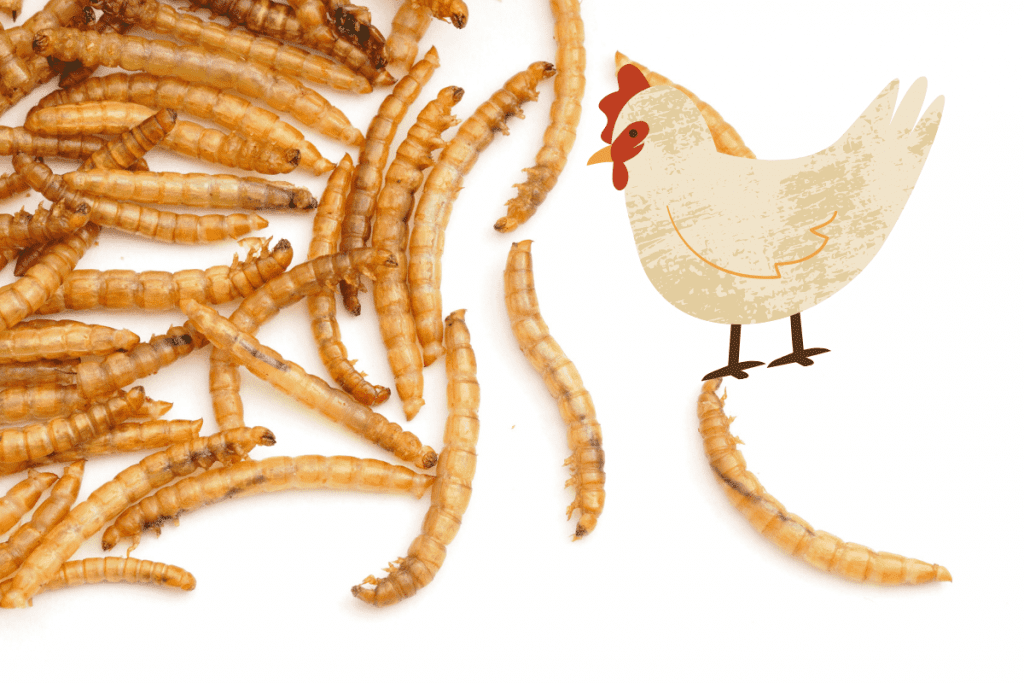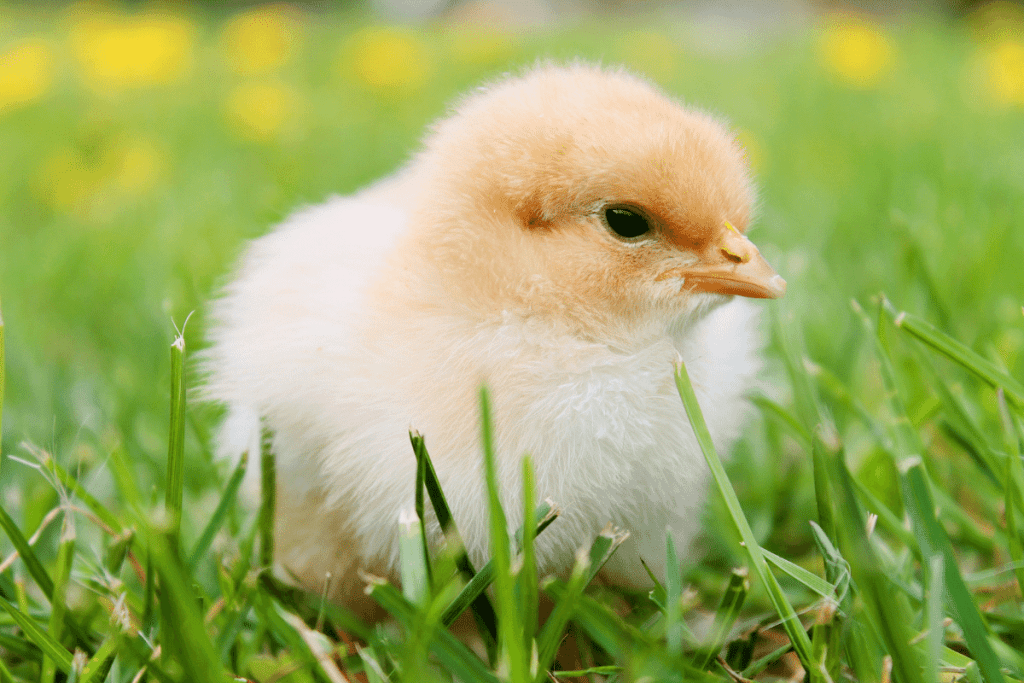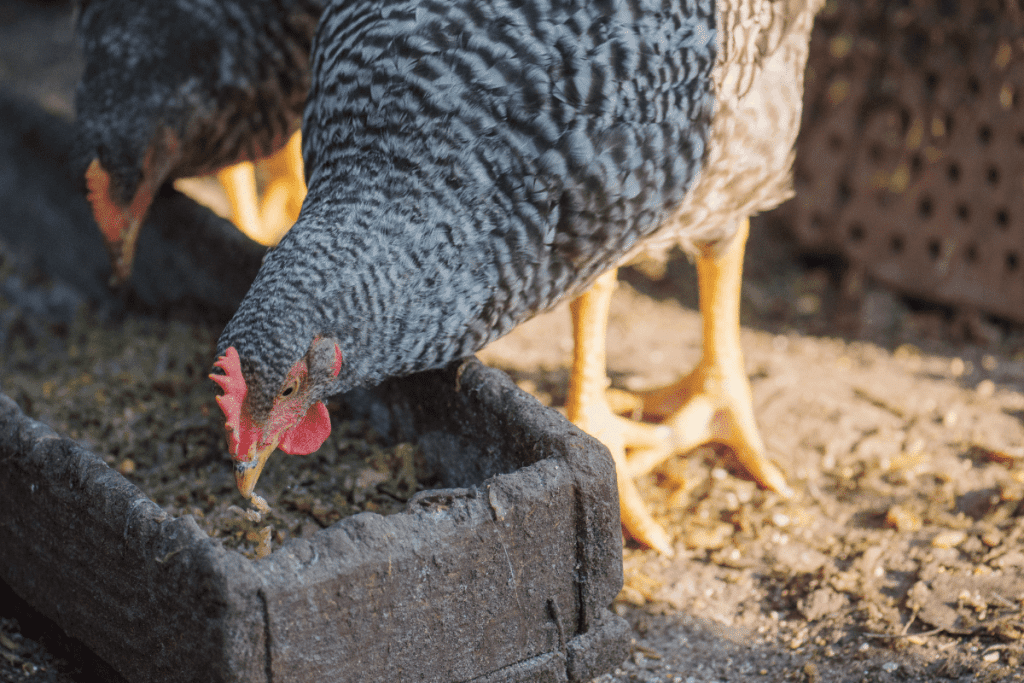There’s a lot to say about mealworms for chickens.
While they offer many benefits, they’re outright illegal in some cases.
This can make it difficult to figure out whether mealworms are good for your birds as a chicken owner.
Don’t worry, though.
We’re here to help break down what mealworms can do for your chicken and some of the downsides and regulations surrounding them.

Table of Contents
ToggleIs It Illegal to Feed Mealworms to Chickens?
Feeding chickens mealworms is illegal in some parts of the world, including the UK and the EU. This was part of a larger ban to prevent disease in livestock due to unregulated mealworm conditions.
You aren’t allowed to turn to mealworms for your chicken just anywhere.
In some cases, it’s illegal to feed mealworms to your chicken.
For example, as of 2014, the UK and the EU banned feeding mealworms to chickens, including if you have a few backyard chickens on residential property.
You aren’t allowed to have dried terrestrial invertebrates, unapproved dried aquatic invertebrates, or processed animal proteins in farm animal feed or treats.
This was part of a larger ban meant to reduce the risk of disease in livestock.
The decision came after the Bovine spongiform encephalopathy (BSE) outbreaks in the UK.
You may have heard of BSE, referred to before as mad cow disease.
In the early 2000s, outbreaks of foot-and-mouth disease in the UK influenced these legal decisions on livestock feed.
There are similar regulations in the United States, but they’re often targeted at larger production farms.
After all, the major concern with these regulations is to prevent the spread of diseases.
This means both diseases are passed between the birds in a flock and on to consumers who eat the product.
All in all, it’s best to make sure to check the local laws in your area for your type of farm before buying mealworms for your chicken.
After all, laws are subject to change, and it’s best to make sure you have the most up-to-date, localized legal information for running your farm and caring for livestock animals.
Can I Give My Chickens Mealworms Every Day?
Mealworms aren’t good for chickens to have every day. They contain higher fat and protein levels than chickens need, so they’ll quickly become overfed and overweight.
If you feed your chicken mealworms, it isn’t something you’ll want to do every day.
Just because your chicken finds them tasty doesn’t mean they’re good for them all the time.
Feeding your chickens too many mealworms can lead to a lot of problems.
Backyard chicken keepers who overfeed their backyard flock mealworms are likely to see weight gain, lethargy, and other effects on their health, mostly due to a misbalanced diet.
Rather, mealworms work great as treats with a bit of protein content for your birds.
As a general rule, don’t use mealworms for more than 10% of a chicken’s diet.
Put another way, limit these tasty snacks for your chickens to about twice a week.
Are Dried Mealworms OK for Chickens?
Mealworms are a great snack for chickens for a variety of reasons. For one, they tend to love them, and they make for a tasty treat for your chickens – even wild birds love them! In addition, mealworms can be good for your chicken too.
They’re a great source of nutrients, so they’re a great way to give your chicken a treat they’ll love while still giving them something safe and even beneficial.
Of course, quality goes a long way here.
Some farmers choose to raise their mealworms for their chicken.
However, if you don’t want to or can’t dedicate the time or space to the endeavor, there are plenty of store-bought mealworms suitable as treats for chickens.
We recommend bulk non-GMO dried mealworms like these on Amazon.
When Can Chickens Eat Mealworms?

Chickens can eat mealworms as young as two weeks of age, though many suggest waiting until they’re a little bigger with a stronger digestive system at one month of age.
Just like any other food, you want to introduce mealworms to your chicken’s diet at the right time.
In particular, it’s important to wait until a chicken is old enough to eat and properly digest a certain food before you introduce it into their diet.
The good news is you don’t have to wait very long before it’s possible to introduce your chicken to these tasty treats.
With birds like chickens, you aren’t waiting for them to grow teeth either.
Rather they rely on their gizzard to break down the food they eat.
For the gizzard to work, a chicken gathers particles, usually rock, to help grind up food.
However, they need time to gather it rather than the process kickstarting by itself.
A baby chicken may not have as great digestion before they pick this grit up.
After a week or two, though, the baby chicken should have an easier time digesting mealworms, so you don’t necessarily have to wait until your chicken is an adult to let them benefit from the additional protein in these treats.
Check out our massive guide on what chickens can eat.
How Many Mealworms Do Chickens Need?
If you feed your chicken mealworms for extra protein, make sure not to use the mealworms for more than 10% of their diet. While they’re a great source of additional protein, they can’t build a balanced diet on their own.
As for how many mealworms to give your chicken at once depends on what you’ve bought.
The answer is different for dry and fresh mealworms.
If you’re dealing with live mealworms, only give your chicken less than 10.
As for dried mealworms, go a little lighter and don’t give them more than four mealworms in a serving.
They can have this treat about twice a week.
When you give your chicken mealworms, ensure you don’t leave them out and uneaten them around the coop.
You’ll attract wild birds rather than let your chicken save a tasty treat for later.
Are Mealworms a Good Source of Protein for Chickens?
For the chickens and wild birds who love them, mealworms offer a lot of nutrients. One of the chief benefits of mealworms is that they’re full of proteins for your chicken. This makes them a good option as protein snacks when you want to increase your backyard flock’s protein intake, such as during molting season.
What’s the Problem with Feeding Mealworms to Your Chicken?

While mealworms have a lot of nutrients for chickens, they’re also high in carbs. If you go overboard and give them to your chicken in excess, you might end up with an overweight chicken.
We’ve already mentioned a few drawbacks to mealworms for your chicken.
However, let’s take a moment to catalog all of the risks associated with feeding your chicken mealworms.
Unfortunately, more treats don’t necessarily mean happier chickens.
The good news is this issue is easily avoided; just make sure to give these treats for chickens out in moderation.
The other main downside is that mealworm isn’t an option for chicken flocks by legality in some places.
Do Chickens Need the Protein in Mealworms?
The average chicken may not need additional protein sources to achieve a well-rounded diet regularly. Still, there are a few situations in which the extra protein can help, such as when laying more eggs or getting ready for winter.
For the most part, protein snacks like mealworms are great to add to your livestock’s diet.
Do they necessarily need it, though?
It depends.
Your flock can benefit from the additional protein while they’re molting in the fall.
A large portion of the feathers are made up of protein, so mealworms can help them get some of this back.
You might see egg production slow during this time of year as well.
On the topic of egg production, mealworms are sometimes helpful here too.
The protein in mealworms can sometimes offer the boost in egg production you’ve been looking for.
More generally than the production of eggs, mealworms also help boost your chicken’s immune system.
Once winter rolls around, they can continue to benefit from the nutritious proteins while they’re more kept up in the warm coop rather than wandering and foraging for snacks.
Don’t forget, while the protein in the right amounts is good; you don’t want to overdo it.
These benefits aren’t going to play out as well if you overfeed your chickens mealworms.
Will Birds Eat Dried Mealworms?
Fresh mealworms are an option for chickens if you want, but many owners also turn to dried mealworms. The good news is your coop will likely love the treat, whether they’re fresh or dried.
How to Feed Dried Mealworms to Your Chickens
It’s not hard to feed dried mealworms to your chickens. Chickens will probably go for a dried mealworm the same way they go after any other protein snacks they love.
The good news is it’s not a problem to feed your chickens dried mealworms as they are in most cases.
If you want to provide an extra tasty treat, rehydrate the dried mealworms before giving them to your chickens.
The simplest option is to toss the little protein snacks on the ground.
From there, your chickens will peck them up like any other snack you throw down to them.
If you have a chicken who doesn’t mind it, you could even put the dried mealworms in your palm and offer them out to your chicken.
If your chicken is more skittish or nervous, they may not feel comfortable eating out of your hand.
Give them to your chickens in any way they usually like to eat their treats.
Should You Soak Dried Mealworms?
While dried mealworms will do the trick, you can rehydrate them if you want to give your chickens a juicier treat. Doing so provides more water to your fowl.
The first thing you’ll want to do is put your mealworms in a container.
Make sure they have plenty of spare room in the container, and it’s easy to fill with water.
Once you’re ready, fill the container with warm water.
You’ll want to add enough, so all mealworms are wet.
If they’re floating rather than completely submerged, it’s OK.
Finally, you just need to let them sit.
It’s possible to get away with letting them soak for half an hour, but let your mealworms soak in the warm water overnight for the best results.
When you get back in the morning, you’ll notice they’ve absorbed plenty of water.
When ready to use them, just drain the water out and dole out the mealworms to your chickens.
The sooner they come from the water and the chicken, the more full of moisture they’ll be!
Why Do Chickens Love Mealworms?
There are a lot of benefits of mealworms for chickens, but the birds just love the taste. They’re even handy when you’re training your chickens or just want them to get a little friendlier with you because they love them so much.
Your chickens love mealworms the same way you might love your favorite snack when it comes down to it.
They find them tasty!
Since chickens love mealworms so much, they’re a great tool to forge a bond with your chicken if you want them to act a little friendlier.
Remember: overdoing it with this treat won’t make your chickens as happy as you hope.
Just because they love it when mealworms appear in their day, the negative effects of overfeeding your chickens will hurt them more than help them in the long run.
Are Calci Worms Good for Chickens?
Calci Worms are a product similar to mealworms, but they are higher in calcium and fats. This makes them better for egg-laying but more dangerous to their health if you overfeed them.
While mealworms taste great to chickens, they are far from your only option for chicken treats.
Another option many chicken owners consider is Calci worms.
These worms are another insect chicken that reptile owners are rather fond of. Yet, it’s worth noting that these worms are different from mealworms.
Whereas mealworms are great sources of proteins, Calci worms are higher in their fat and calcium content.
Since Calci worms are so high in calcium, they’re a great choice if you start to notice poor laying in your chickens.
Much like mealworms, though, you won’t want to overdo it.
They’re better as a treat in the right quantities than as an alternative to feed.
Related: Can you feed chicken meat to chickens?
How useful was this post?
Click on a star to rate it!
We are sorry that this post was not useful for you!
Let us improve this post!
Tell us how we can improve this post?
